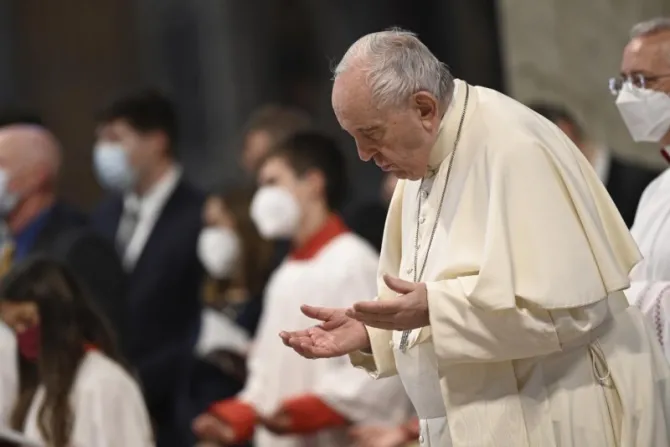Pope Francis at the Divine Mercy Sunday Mass at St. Peter’s Basilica on April 24, 2022. | Vatican Media
Pope Francis in his homily for Divine Mercy Sunday encouraged everyone, especially priests, to remember the moments in their lives when they have experienced God’s forgiveness, and the joy and peace that God’s forgiveness brings.
“The joy God gives is indeed born of forgiveness. It bestows peace. It is a joy that raises us up without humiliating us,” Pope Francis said during his homily at the Mass celebrated in St. Peter’s Basilica.
“Brothers and sisters, let us think of all those times when we received the pardon and peace of Jesus. Each one of us has received them; each one of us has had that experience. It is good for us to remember those moments. Let us put the memory of God’s warm embrace before the memory of our own mistakes and failings. In this way, we will grow in joy.”
The pope urged meditation on the three times in the Gospels when Jesus uses the greeting: “Peace be with you,” the first of which being Jesus’ first encounter with his disciples following his resurrection.
When Jesus’ disciples first encounter the risen Jesus, they react joyfully, despite having abandoned their master during his Passion and death. Despite courageously following Jesus in the past, “They had good reason to feel not only afraid but useless; they had failed,” the pope said.
“In this climate, they hear for the first time, ‘Peace be with you!’ The disciples ought to have felt shame, yet they rejoice. Why? Because seeing his face and hearing his greeting turned their attention away from themselves and towards Jesus,” Pope Francis said.
“They were distracted from themselves and their failures and attracted by his gaze, that brimmed not with severity but with mercy. Christ did not reproach them for what they had done but showed them his usual kindness. And this revives them, fills their hearts with the peace they had lost and makes them new persons, purified by a forgiveness that is utterly unmerited.”
The forgiveness that Jesus shows to his disciples in the Gospels is the same forgiveness He extends through the sacrament of Confession, the pope said.
The second time Jesus says “Peace be with you” is when he gives his disciples the Holy Spirit, giving them the ability to forgive sins and thus making them “dispensers of the mercy that they themselves received.”
Speaking to priests, the pope told them to they must first accept God’s forgiveness if they are to extend that forgiveness to others.
“I am now speaking to you, missionaries of mercy: if you do not feel forgiven, do not carry out your service as a missionary of mercy until you feel that forgiveness,” the pope said.
“The mercy that we have received enables us to dispense a great deal of mercy and forgiveness. Today and every day, in the Church forgiveness must be received in this same way, through the humble goodness of a merciful confessor who sees himself not as the holder of some power but as a channel of mercy, who pours out upon others the forgiveness that he himself first received. From this arises the ability to forgive everything because God always forgives everything.”
There is no need to “torment” the faithful when they come to Confession, the pope said.
“It is necessary to understand their situation, to listen, to forgive and to offer good counsel so that they can move forward. God forgives everything and we must not close that door to people,” he said.
Finally, the pope noted, Jesus says “Peace be with you” to the Apostle Thomas, who doubted the Lord’s resurrection until he was able to put his hand in Jesus’ wounds.
“There are times of difficulty when life seems to belie faith, moments of crisis when we need to touch and see. Like Thomas, it is precisely in those moments that we rediscover the heart of Christ, the Lord’s mercy,” Pope Francis said.
“In those situations, Jesus does not approach us in triumph and with overwhelming proofs. He does not perform earth-shattering miracles but instead offers us heartwarming signs of his mercy. He comforts us in the same way he did in today’s Gospel: he offers us his wounds. We must not forget this fact. In response to our sin, the Lord is always present offering us his wounds.”
God’s mercy often makes us more aware of our neighbours’ wounds, the pope said, encouraging everyone to seek to help those suffering in mind or body, to bring peace to those suffering spiritually or physically, and to listen and bring comfort to another person. In doing such things we “encounter Jesus,” the pope said.
“We think that we are experiencing unbearable pain and situations of suffering, and we suddenly discover that others around us are silently enduring even worse things. If we care for the wounds of our neighbour and pour upon them the balm of mercy, we find being reborn within us a hope that comforts us in our weariness,” the pope said.
Divine Mercy Sunday, celebrated the Sunday after Easter each year, was instituted by Pope St. John Paul II in 2000.
St. Maria Faustina Kowalska, a 20th-century Polish nun who received prophetic messages from Christ, received revelations about the infinite mercy of God – coined the “Divine Mercy” – and her obligation to spread the message to the world, as recorded in her diary, “Divine Mercy in my soul.”
Source: CNA

